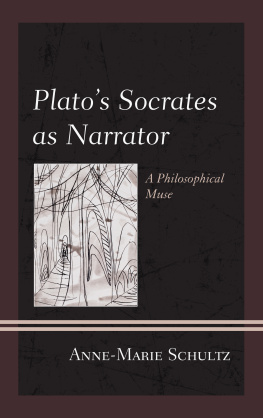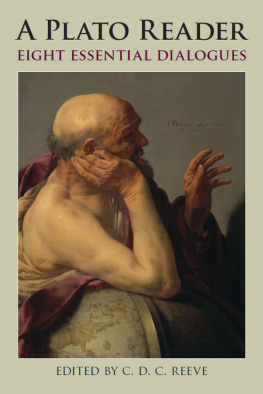Plato - Republic (Focus Philosophical Library)
Here you can read online Plato - Republic (Focus Philosophical Library) full text of the book (entire story) in english for free. Download pdf and epub, get meaning, cover and reviews about this ebook. year: 2012, publisher: Hackett Publishing Company, Inc., genre: Romance novel. Description of the work, (preface) as well as reviews are available. Best literature library LitArk.com created for fans of good reading and offers a wide selection of genres:
Romance novel
Science fiction
Adventure
Detective
Science
History
Home and family
Prose
Art
Politics
Computer
Non-fiction
Religion
Business
Children
Humor
Choose a favorite category and find really read worthwhile books. Enjoy immersion in the world of imagination, feel the emotions of the characters or learn something new for yourself, make an fascinating discovery.
- Book:Republic (Focus Philosophical Library)
- Author:
- Publisher:Hackett Publishing Company, Inc.
- Genre:
- Year:2012
- Rating:5 / 5
- Favourites:Add to favourites
- Your mark:
- 100
- 1
- 2
- 3
- 4
- 5
Republic (Focus Philosophical Library): summary, description and annotation
We offer to read an annotation, description, summary or preface (depends on what the author of the book "Republic (Focus Philosophical Library)" wrote himself). If you haven't found the necessary information about the book — write in the comments, we will try to find it.
Republic (Focus Philosophical Library) — read online for free the complete book (whole text) full work
Below is the text of the book, divided by pages. System saving the place of the last page read, allows you to conveniently read the book "Republic (Focus Philosophical Library)" online for free, without having to search again every time where you left off. Put a bookmark, and you can go to the page where you finished reading at any time.
Font size:
Interval:
Bookmark:
PLATO
REPUBLIC
The Focus Philosophical Library
Aristotle: De Anima M. Shiffman
Aristotle: Nicomachean Ethics J. Sachs
Aristotle: Poetics J. Sachs
Athenian Funeral Orations J. Herrman
Descartes: Discourse on Method R. Kennington
Empire and the Ends of Politics (Plato/Pericles) S. D. Collins and D. Stauffer
Four Island Utopias (Plato, Euhemeros, Iambolous, Bacon) D. Clay and A. Purvis
Hegel: The Philosophy of Right A. White
Liberty, Equality & Modern Constitutionalism, Volume I G. Anastaplo
Liberty, Equality & Modern Constitutionalism, Volume II G. Anastaplo
Lucretius: On the Nature of Things W. Englert
Plato and Xenophon: Apologies M. Kremer
Plato: Euthydemus M. Nichols
Plato: Gorgias J. Arieti and R. Barrus
Plato: Gorgias and Aristotle: Rhetoric J. Sachs
Plato: Meno G. Anastaplo and L. Berns
Plato: Parmenides A. K. Whitaker
Plato: Phaedo E. Brann, P. Kalkavage, and E. Salem
Plato: Phaedrus S. Scully
Plato: Republic J. Sachs
Plato: Sophist E. Brann, P. Kalkavage, and E. Salem
Plato: Statesman E. Brann, P. Kalkavage, and E. Salem
Plato: Symposium A. Sharon
Plato: Theatetus J. Sachs
Plato: Timaeus P. Kalkavage
Socrates and Alcibiades: Four Texts D. Johnson
Socrates and the Sophists J. Sachs
Spinoza: Theologico-Political Treatise M. Yaffe
PLATO
REPUBLIC
Translation, Glossary,
and Introductory Essay
Joe Sachs
ST. JOHNS COLLEGE, ANNAPOLIS
with an Afterword by John White
Focus Publishing
An Imprint of Hackett Publishing Company
Indianapolis/Cambridge
PLATO
Republic
2007 by Joe Sachs
Previously published by Focus Publishing/R. Pullins Company
Focus Publishing: An Imprint of Hackett Publishing Company
PO Box 44937
Indianapolis, Indiana 46244-0937
www.hackettpublishing.com
Cover image by Emily Kutler
ISBN: 978-1-58510-525-0
Also available in paperback (ISBN: 978-1-58510-261-7).
Imitation John F. White, 2006, used by permission
All rights are reserved.
Last updated February 2012
CONTENTS
The Republic
If a large random group of people were asked to name an important work of philosophy, the answer given most often would probably be Platos Republic. Why it merits such distinction is something fewer people might venture to say. Those whose acquaintance with the book is primarily second-hand, guided by a lecturer or by books about it, could be excused for being puzzled about its enduring power. It is said to be a portrait of an ideal state, but one that no actual government has ever tried to put into practice, and it is said to contain a statement of a famous philosophic theory, but one it would be hard to find anyone who believed in. What, then, makes it more than a strange relic of obsolete thinking? The answer is easily found by anyone who ignores the masses of learned explanations that surround the Republic, and simply plunges into reading it. There has rarely been a book that so successfully grabs a reader and stirs spirited responses.
A number of philosophers over the centuries have written dialogues. That means, in most cases, that they have written arguments and counterarguments, and put them in the mouths of imaginary speakers. Plato went about it the opposite way. He wrote imagined conversations among people whom, for the most part, he knew, and made those conversations rise to the level of philosophic discussion. Plato did not treat philosophy as something that could be delivered or presented or even imitated in a written work. He knew that there is no way to encounter philosophy except from the inside, and he wrote with the purpose of stimulating, provoking, and inspiring the experience of it. He himself had been strongly affected by listening to the conversations Socrates used to have in public, and he made Socrates the primary speaker in most of his dialogues. Even in those dialogues in which Socrates is not present, or says little, a Platonic dialogue is always an imitation of Socrates. Plato made the things he wrote as substitute encounters with Socrates: not depictions of such encounters for us to watch, but evocations of them for us to experience. So great can be the power of imitative fiction that Plato successfully sets in motion philosophic activity every time a reader gives him the slightest chance.
A chance to respond to Platos imitation of Socrates does not depend on being favorably disposed to their words in advance, or even on approaching the dialogues with an open mind. Since the dialogues teach no doctrine, an antagonistic response is as effective as any other kind in making a reader a more active thinker. Within the Republic, Socrates is challenged in Book I by a hostile and angry opponent, and then again in Book II by two friendly but determined young men who think he hasnt given that opponent anything like an adequate answer. All three, and a few other characters who get hooked along the way, have one thing in common: they all put aside everything else they intended to do for many hours, and become absorbed in a conversation about philosophic topics and about philosophy itself. The only person present who is immune to it all is a very old man, intent on preparations for his death. The rest of the characters in the dialogue are a lot like us, a diverse array of people who pick up the Republic, and for one reason or another cant put it down.
The Republic depicts people with different interests and desires being brought together into a shared activity freely chosen by each; this is a reflection not only of our situation as readers of it, but also of its primary theme. The dramatic situation in a Platonic dialogue is never mere literary ornamentation for a set of arguments, but always in some way shows the reader the way to an answer to the question discussed in it. The question that sets in motion the whole discussion in the Republic is, what is justice? That question receives a succession of formal answers, but none of them reveals as much about what justice is as does the human interaction we witness. In the dialogue, one person pressures a second person into joining him and his friends to help them kill a little time, a third person leaves the gathering to pursue his own business, a fourth person tries to break up the discussion as soon as it begins to get somewhere, and a fifth and sixth person insist on imposing their concerns on the group, but with the adroit management of the situation by one of their number, they become a harmonious partnership in an extended activity that in some way satisfies them all. If we can say what makes the Republic possible as a living event, an understanding of what justice is cannot be far away.
The one adroit member of the group who manages to pull them all together is of course Socrates. The Republic is one of Platos longest dialogues, and it is in some ways all Socrates. Every word of it is given to us through Socrates narration, and no other dialogue is so packed with his opinions, his imagination, and his ways of looking at things. At the same time, though, no dialogue so emphatically presents a partnership in learning. Most dialogues of Plato resemble one or more aspects of Book I of the Republic, in which someone is brought to realize he understands less than he thought he did, someone else is provoked to anger, a few others begin to be curious, and the end comes with a question sharpened and unresolved. In the Republic, we are given three more books in which a couple of intelligent listeners initiate a dialogue about the original dialogue, and then six more books in which all those still present commit themselves to remain involved, and state a consensus about how the discussion should proceed. The beginning of Book V is presented as something like a constitutional convention in which those assembled unanimously and explicitly associate themselves into a community and choose a leader. So the
Next pageFont size:
Interval:
Bookmark:
Similar books «Republic (Focus Philosophical Library)»
Look at similar books to Republic (Focus Philosophical Library). We have selected literature similar in name and meaning in the hope of providing readers with more options to find new, interesting, not yet read works.
Discussion, reviews of the book Republic (Focus Philosophical Library) and just readers' own opinions. Leave your comments, write what you think about the work, its meaning or the main characters. Specify what exactly you liked and what you didn't like, and why you think so.

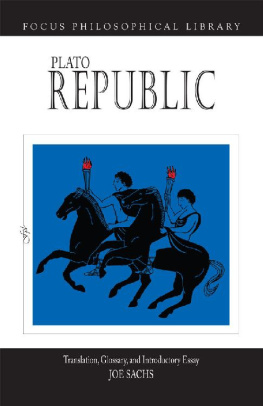
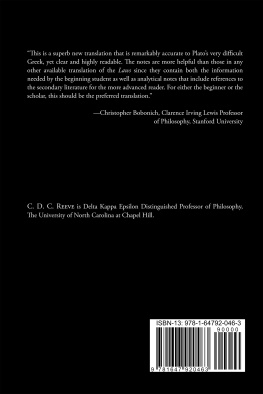
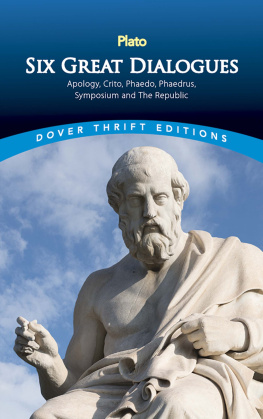

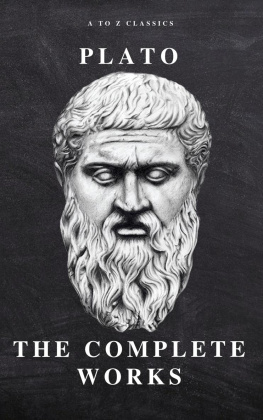


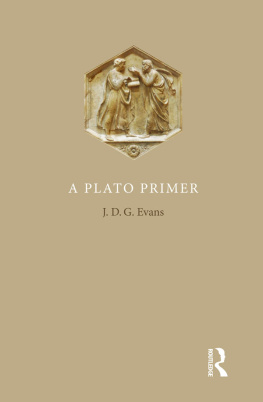
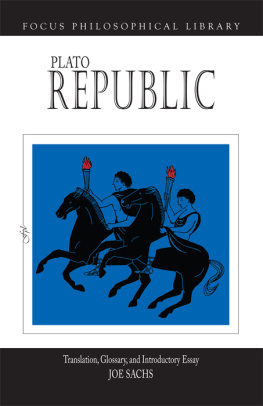
![Averroes on Platos Republic [trans. Ralph Lerner] (Cornell - Averroes on Plato’s Republic](/uploads/posts/book/324094/thumbs/averroes-on-plato-s-republic-trans-ralph.jpg)
